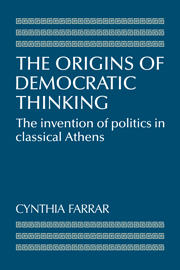Book contents
- Frontmatter
- Contents
- Dedication
- Preface
- 1 Ancient reflections: a force for us
- 2 Order in autonomy: the ungoverned cosmos and the democratic community
- 3 Protagoras: measuring man
- 4 Man's measurings: cosmos and community
- 5 Thucydides: reflecting history – man and the community
- 6 Democritus: reflecting man – the individual and the cosmos
- 7 Living democracy?
- Bibliography
- Indexes
2 - Order in autonomy: the ungoverned cosmos and the democratic community
Published online by Cambridge University Press: 23 October 2009
- Frontmatter
- Contents
- Dedication
- Preface
- 1 Ancient reflections: a force for us
- 2 Order in autonomy: the ungoverned cosmos and the democratic community
- 3 Protagoras: measuring man
- 4 Man's measurings: cosmos and community
- 5 Thucydides: reflecting history – man and the community
- 6 Democritus: reflecting man – the individual and the cosmos
- 7 Living democracy?
- Bibliography
- Indexes
Summary
Man's awareness and understanding of himself as an agent are shaped through interaction with the world. The self-conception peculiar to the citizen of a political community (polis) in ancient Greece, therefore, has a history. By following the outlines of this history one can trace the development of a highly intense and reflective form of political self-understanding, the self-consciousness of democratic Athens. In a context established in large measure by local experience, but also by general developments in man's understanding of his relationship to the cosmos, the Athenians posed and explored the question of reconciling autonomy, or self-determination, with political order. A self-conscious sense of agency arose in conjunction with social change, which sparked a growing awareness of the sources of order in the natural and social world. Men experienced themselves and their relation to others differently. These changes were reflected in and enhanced by altered forms of self-expression: oral poetry gave way to written poetry and prose, epic to tragedy and unwritten convention to written law. In this chapter I shall attempt to bring into focus this very general formulation of the way in which the Athenians came to think reflectively about themselves as autonomous agents in a political community. Here and in the next chapter, I indicate how they sought to resolve the issues raised by such reflection.
- Type
- Chapter
- Information
- The Origins of Democratic ThinkingThe Invention of Politics in Classical Athens, pp. 15 - 43Publisher: Cambridge University PressPrint publication year: 1988



